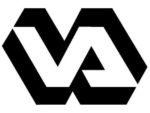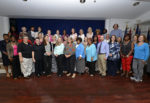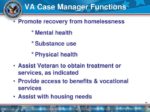For one to fully understand the insulting mentality of the social worker class, one need only call a Veterans Administration facility.
Thanks to self-serving politicians with no term or office limits, exploitative nonprofits and the social worker class, it’s automatically assumed most veterans are troubled and oh-so close to ending it all. From experience in dealing with all of the above in having to deal with the condescension and almost uniform callous indifference, we understand what drives some veterans to the very alcohol, drug abuse, and potential suicide social workers claim to want to head off.
 How Do I Know I Need A Social Worker?
How Do I Know I Need A Social Worker?
If you really aren’t sure what you need, but things just don’t feel right
— Department of Veteran Affairs
You may have just opened the door to a predator. This is not to say all veteran social workers are bad. We just haven’t personally experienced any of the motivated ones yet.
Not all veterans have “issues” when they reenter the civilian world. So, who started that stigmatizing notion?
While we’re all led to believe a concerning percentage of military personnel exit service with post-traumatic stress disorder, the numbers tend to vary greatly.
 Post-traumatic stress disorder (PTSD) rates have increased among members of the UK armed forces, new research suggests. The overall rate of probable PTSD among current and ex-serving military personnel was 6% in 2014-16, compared with 4% in 2004-06.
Post-traumatic stress disorder (PTSD) rates have increased among members of the UK armed forces, new research suggests. The overall rate of probable PTSD among current and ex-serving military personnel was 6% in 2014-16, compared with 4% in 2004-06.
— The Guardian, 10/8/18
Operations Iraqi Freedom (OIF) and Enduring Freedom (OEF): About 11-20 out of every 100 Veterans (or between 11-20%) who served in OIF or OEF have PTSD in a given year.
Gulf War (Desert Storm): About 12 out of every 100 Gulf War Veterans (or 12%) have PTSD in a given year.
Vietnam War: About 15 out of every 100 Vietnam Veterans (or 15%) were currently diagnosed with PTSD at the time of the most recent study in the late 1980s, the National Vietnam Veterans Readjustment Study (NVVRS). It is estimated that about 30 out of every 100 (or 30%) of Vietnam Veterans have had PTSD in their lifetime.
— Department of Veteran Affairs
It appears it all depends on who’s doing the diagnosing because the Department of Veterans Affairs is also a magnet for mostly women who’ve never served in the Armed Forces and because of their educational indoctrination, probably don’t care much for the military. (We were once told by a nonprofit department head that she’d have more money to help veterans if the government didn’t spend so much for “armaments”. Cart before horse…?)
Do an online image search for “veteran social worker” and you’ll see a consistent….







It all starts as an early-targeted career path, so ideological noses are held and academic proficiency appears (in some cases) sacrificed.

Don’t “axe” us why….
WHAT IS A MILITARY SOCIAL WORK DEGREE?
A military social work degree is most often found as a Master of Social Work (MSW) program. It studies the many ways to help people solve and cope with problems. Then applies these concepts to support active-duty personnel, veterans and their families.
Those who want to use counseling methods need a master’s degree and state license. They’ll also need 2 years of supervised field work. A military social work degree may ready you to pursue this licensure. Or, at the bachelor’s level, may ready you to help out as a case manager.
— Education Connection
From the onset, veterans are portrayed as helpless human beings with “problems” that can only be addressed by a social worker’s “case management”, thus close life supervision. It’s clear stigmatized veterans are a great employment lure and keeping them vulnerable and dependent is profitable.
 50 Highest Paying Jobs in Social Work
50 Highest Paying Jobs in Social Work
#4 Veteran’s Affairs Social Worker
Average Salary: $85,639.63 (as of 2022)
Job Outlook: Excellent (20% growth rate within the next decade)
Not bad. Decent money right out of the box, not to mention those great “golden handcuff” bennies associated with working for he federal government. So, the more the perception goes out that veterans are potentially crazy and are in need of supervision, “growth” is assured.
 The 2014 Army Study to Assess Risk and Resilience in Service members compared service members to the general population and found that the rate of major depression is five times higher among soldiers, post-traumatic stress disorder (PTSD) is nearly 15 times as high, and intermittent explosive disorder is six times as high.
The 2014 Army Study to Assess Risk and Resilience in Service members compared service members to the general population and found that the rate of major depression is five times higher among soldiers, post-traumatic stress disorder (PTSD) is nearly 15 times as high, and intermittent explosive disorder is six times as high.
They seldom reveal what the rate of depression was upon discharge and compare that to after the veteran had to deal with an unmotivated social worker or nonprofit for a period of time. That might not be a good number.
 VA social workers are responsible for ensuring continuity of care through the admission, evaluation, treatment, and follow-up processes. This includes coordinating discharge planning and providing case management services based on the patients clinical and community health and social services resources. Social workers often provide long-term case management services to veterans who are at high risk of being admitted to a hospital, those who have very complex medical problems, and those who need additional help and support. They are available when needed to provide and coordinate a variety of services including counseling and support services. Social workers can advocate and go to bat for those who have a hard time doing it by themselves.
VA social workers are responsible for ensuring continuity of care through the admission, evaluation, treatment, and follow-up processes. This includes coordinating discharge planning and providing case management services based on the patients clinical and community health and social services resources. Social workers often provide long-term case management services to veterans who are at high risk of being admitted to a hospital, those who have very complex medical problems, and those who need additional help and support. They are available when needed to provide and coordinate a variety of services including counseling and support services. Social workers can advocate and go to bat for those who have a hard time doing it by themselves.
The U.S. Department of Veteran’s Affairs employs approximately 12,000 social workers.
— Best MSW (Master of Social Work) Programs
Veteran social workers also have advocacy nonprofits to make sure the jobs keep coming. After all, they’re only being paid with that never-ending supply of taxpayer dollars.
 The Association of VA Social Workers encourages the development of comprehensive Social Work services to veteran beneficiaries through education, collaboration and advocacy to enhance the effectiveness of all Social Workers throughout the entire US Department of Veteran Affairs (VA) Healthcare system. The Association advocates for the recruitment, retention, and increased recognition of Social Workers of the VA. At this time, there are more than 12,000 social workers throughout the VA system. More than 1500 student interns are preparing for their Masters level social work degrees (from colleges and universities approved by the Council on Social Work Education), many of whom are receiving VA educational stipiends during their field placements in the VA. (How VA Social Workers Help Veterans)
The Association of VA Social Workers encourages the development of comprehensive Social Work services to veteran beneficiaries through education, collaboration and advocacy to enhance the effectiveness of all Social Workers throughout the entire US Department of Veteran Affairs (VA) Healthcare system. The Association advocates for the recruitment, retention, and increased recognition of Social Workers of the VA. At this time, there are more than 12,000 social workers throughout the VA system. More than 1500 student interns are preparing for their Masters level social work degrees (from colleges and universities approved by the Council on Social Work Education), many of whom are receiving VA educational stipiends during their field placements in the VA. (How VA Social Workers Help Veterans)
— Association of VA Social Workers
According to the Association, only one of their 2018 “Social Workers of the Quarter” was a veteran. The rest appear to have gone straight from college into the field and wound up working with… veterans.
When inexperienced people are given, in essence, supervisory roles that has profound impact on a veteran’s life, it can go to their heads and for too many we’ve experienced, it does.

Earlier this year, I invited some of my former VA colleagues back to the School of Social Work at the University of Illinois at Urbana-Champaign to talk about their experiences as VA social workers. When asked about some of their favorite aspects of working in such a large system, they all overwhelmingly said that one of the best job perks was having so much autonomy.
A gold mine for your average power tripper.
Once social workers are initially trained in the core functions of the system, there truly is a great deal of opportunity to work autonomously within your program area team. Read more about just some of the things VA social workers do. In many instances, you are working on processes and problem-solving within a team structure and support, but with a great deal of independence and trust.
— SocialWorker.com
 The “autonomy” to make a veteran jump through as many hoops as they want, despite the fact that veterans reach out to them when they’re most vulnerable. Some of these fat-and-happy social workers can’t relate to the sense of urgency and should a veteran become irritated by the indifference, social workers have a varying amount of ways to retaliate and put veterans back in their place.
The “autonomy” to make a veteran jump through as many hoops as they want, despite the fact that veterans reach out to them when they’re most vulnerable. Some of these fat-and-happy social workers can’t relate to the sense of urgency and should a veteran become irritated by the indifference, social workers have a varying amount of ways to retaliate and put veterans back in their place.
And we won’t even get into the dysfunctional marriage between the Department of Veterans Affairs and Department of Urban Development when it comes to social worker interagency miscommunication and/or selective interpretations when it comes to veterans in housing distress. All so they can impose themselves on extorted veterans and justify their existence with makework….
 A key component of the program is VA’s case management services. These services are designed to assist Veterans in obtaining and sustaining permanent housing and engage in needed treatment and other supportive services that improve Veterans’ quality of life and end their homelessness. Case Management is the heart of this program and is a requirement for participation in the HUD-VASH voucher program.
A key component of the program is VA’s case management services. These services are designed to assist Veterans in obtaining and sustaining permanent housing and engage in needed treatment and other supportive services that improve Veterans’ quality of life and end their homelessness. Case Management is the heart of this program and is a requirement for participation in the HUD-VASH voucher program.
Make the Call.
You Fought for Our Home. We’ll Fight for Yours.
— HUD-VASH Eligibility Criteria
Sure.
Almost a month ago, we submitted a Freedom of Information Request to the VA to request “the number of veteran VASH housing vouchers given to the Commonwealth of Virginia during FY2019, how many were used by veterans and how many were rolled into Section 8 housing for general public use.” We have yet to have been even issued a reference number, let alone a response. Rolling VASH vouchers into Section 8 (while keeping veterans unaware of their earned benefit) assures local social workers a greater pool of preferred, single mom-illegal alien-refugee recipients at the expense of veterans.
If one of these social workers found themselves potentially days from losing their housing, you know they’d be tapping into all of the potential “rapid re-housing” options they advertise and be in a new place within a week.
How Does it Feel?
Sadly, should any homeless veteran find themself in urgent need of housing, the FIRST thing a social worker suggests is that he or she go to a shelter. It should be a requirement for all social workers in training to give their home and car keys to their trainer. Then that social worker trainee should be left on the street and let them stay in a shelter for three weeks. After that experience, we sincerely doubt a shelter would be their first suggestion to a veteran in peril.
 The best route for veteran independence is finding a good job; not the low wage positions they’re normally steered towards by nonprofit “employment specialists” who spend more time telling said veteran to find jobs online and apply rather than being a “specialist” and make those connections for the veteran. In fact, another constant is the veteran constantly being told by a veteran dot gov or a nonprofit is what they can’t do while that employee or social worker hangs up the phone and continues to earn a paycheck.
The best route for veteran independence is finding a good job; not the low wage positions they’re normally steered towards by nonprofit “employment specialists” who spend more time telling said veteran to find jobs online and apply rather than being a “specialist” and make those connections for the veteran. In fact, another constant is the veteran constantly being told by a veteran dot gov or a nonprofit is what they can’t do while that employee or social worker hangs up the phone and continues to earn a paycheck.
It’s not like a veteran can complain because the social worker is the gatekeeper when it comes to access to benefits earned, being made to wait via giving the veteran conflicting or incorrect information, or when the social worker gets around to it, because he or she can subtly cut the veteran off altogether if desired.
 So, until the Veterans Administration is purged of the social worker industrial complex and is staffed primarily by understanding veterans and/or the caring family members of veterans, the demonization and abuse of veterans will continue and the problems of depression, drug and alcohol abuse brought on after having to deal with them will continue.
So, until the Veterans Administration is purged of the social worker industrial complex and is staffed primarily by understanding veterans and/or the caring family members of veterans, the demonization and abuse of veterans will continue and the problems of depression, drug and alcohol abuse brought on after having to deal with them will continue.
Homelessness and suicides will be the social worker’s promotional tool to keep themselves relevant and employed because if veterans were to actually be properly served, we wouldn’t need so many more social workers and we can’t have that, right?


Leave a Reply